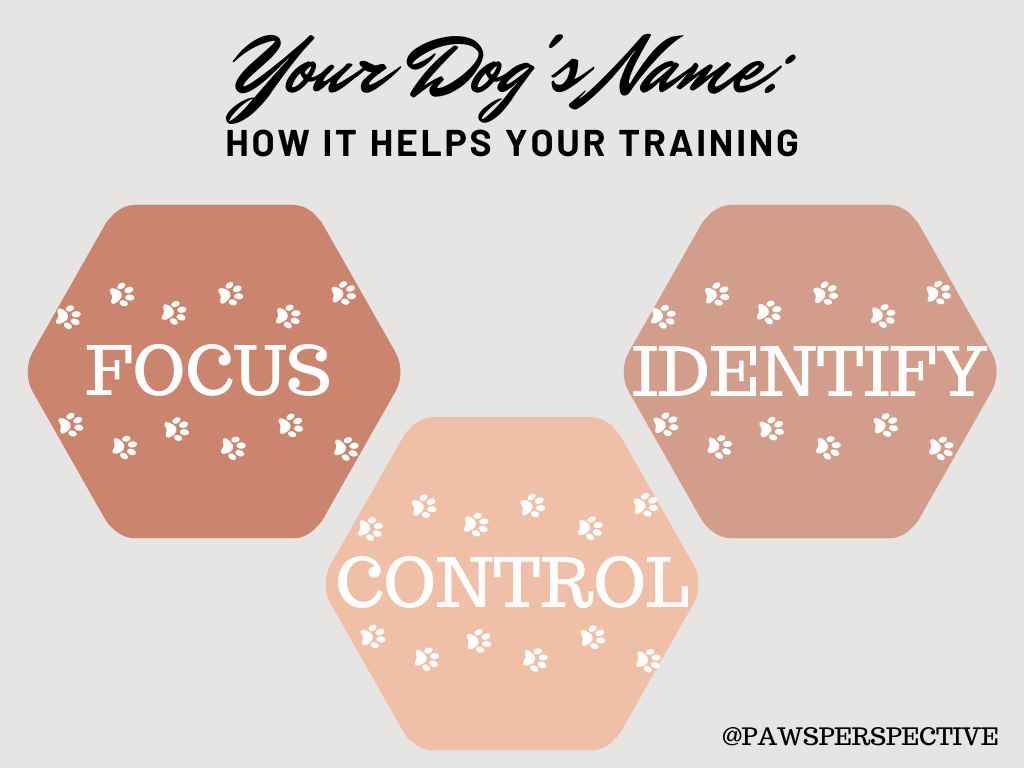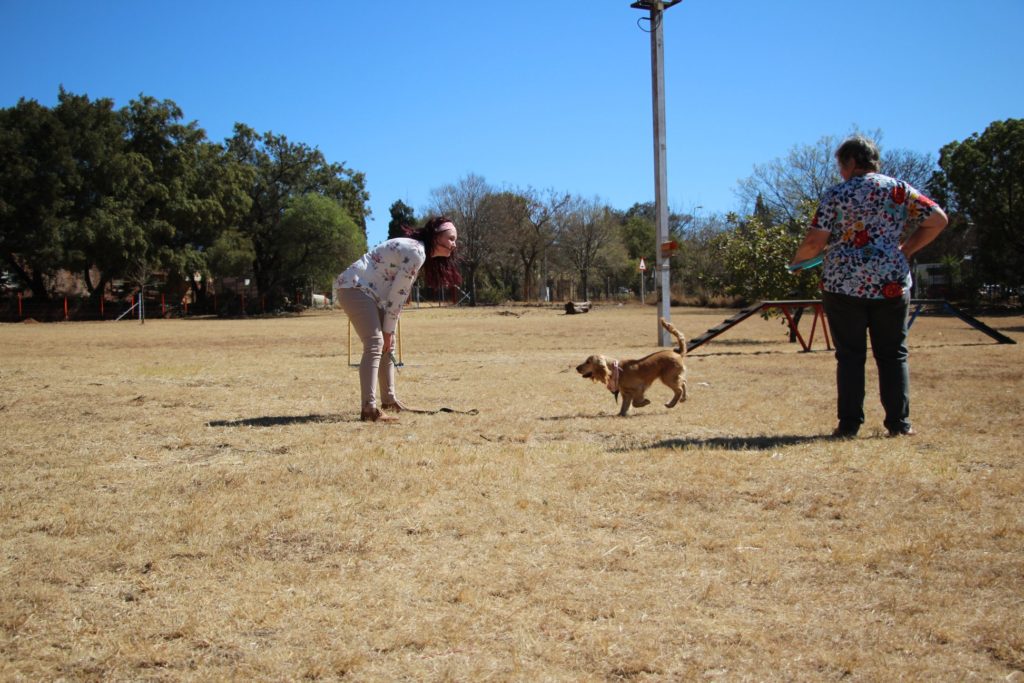If you’re like most dog owners out there, your dog probably has many nicknames. You probably use those nicknames more than your dog’s actual name. Well, it’s the same with me! Both my dogs (Dixie and Joey) have several nicknames of their own. It started to mess with my training sessions.

Only when I became a dog trainer did I realize the role a dog’s name plays when you train them. It has a more significant impact than we might think.
Dog owners like ourselves don’t always realize the power of using our dogs’ real names. We tend to overuse their nicknames, so they don’t react to their real names. For instance, when you regularly use Fluffy’s nickname (Mr. Fluff Ball), he probably won’t respond to “Fluffy” when you call him in a serious situation.
On the other hand, some people overuse a dog’s real name, creating confusion about whether they should react to their names. For instance, if you only say “Fluffy” even though you don’t expect him to do anything, he might learn that he doesn’t always need to react to his name.
So, using your dog’s real name at the right time is not only your secret training weapon, but it can also be a life-saving tool.
Do Dog Names Matter?
You might be wondering what all the fuss is about regarding a dog’s name. Is it really such a big deal? And if so, why do dog names matter? I’ve seen firsthand how important a dog’s name can be by training people and their dogs!
A dog’s name is essential for identification and getting their attention. You can use it to get their attention as they learn to identify with that name. They learn that their names are unique to them. So, it helps them identify the vocal sounds that form their name.
“Your dog’s name is an essential signal you will use when you want to communicate with them.”
Green Acres Kennel Shop
Like people, dogs benefit by having a name so their owners or other people can get their attention even if they’re around other dogs. Getting your dog’s attention is key to training and ensuring you have enough control over them.
Why Your Dog’s Name is Your Best Training Tool
As you know, your dog’s name is vital for identification purposes. But why is a dog’s name an excellent training tool? How does it affect your training when you use your dog’s name compared to the usual commands?
Your dog’s name is excellent for training purposes because:
- the name helps your dog put their focus where you need them to,
- You will have more control over your dog during training sessions, and
- It sets your dog apart from the rest of the dogs around
Your dog’s name is an additive to your training session that will help make it easier. It’s not that your dog will excel at training just because you use their name. You still have to put in the effort of regular training to get them to do what you ask.

A Dog’s Name Helps Them Focus
Because your dog’s name is unique to them (mostly), they learn to react by paying attention whenever you call their name. For instance, if you call your dog, they will look at you, run toward you, or pay a little more attention.
Your dog won’t always focus on the training session. Sometimes they will lose focus, or there might be many distractions. During training sessions, you can use your dog’s name to get them to focus when their attention is elsewhere.
So, teaching your dog to react every time you say their name is an excellent tool to get your dog’s attention away from the distractions and back to the training session.
A Dog’s Name Helps You Have More Control During Training Sessions
While training dog owners and their puppies, I noticed that most people didn’t have control over their dogs. Yes, they were puppies under six months of age, but they should be able to react to their name by that point.
When your dog doesn’t know their name, you will not have proper control over them, especially when training in public places like the park. That’s because your dog didn’t learn to focus on you when you call their name. So this point ties in with the previous one: A dog’s name helps them concentrate.
When your dog can focus on you by reacting to their name, the control is in your hands. You can redirect your dog’s attention to the training session at hand.
You can also have better control over your recall (calling your dog to come back to you from a distance) when they react to their names reliably. You’ll have to train the recall and teach your dog to respond to their name, which will undoubtedly make the exercise easier.
For more tips on training your dog, look at “The Best Way to Train Your Dog- Tips from a Dog Trainer.”
A Dog’s Name Sets Your Dog Apart from the Rest of the Dogs Around
Have you ever tried calling your dog back when they’re around other dogs? This action is only possible because their name and how you say it are unique to them. For instance, they’re playing in the dog park, and you want them to react to their name.
Dogs learn the vocal sounds that make up their name and the emphasis you place on which syllables. Although your dog might have the same name as another, yours are more likely to react to how you say their name. For instance, when I call my dog Dixie, she responds quicker than when someone else tries to call her.
Dixie reacts because we both got used to how I say it, and she knows she’ll get some reward when she responds to her name. So, whether she focuses on me when I say her name, the reward is a treat, a play session, belly rubs, or a “good girl.”

When to Call Your Dog By Their Name
It might seem like a silly idea: to only say your dog’s name in certain situations. No matter how strange the idea is when you say your dog’s name makes a big difference to how quickly they react to it in times of need.
A dog’s name is a command; you should use it when you want your dog to focus on or pay attention to you. For instance, suppose you want your dog to sit, but their focus is on a bird outside the window. Then you’d call their name to get them to focus, then repeat the “sit” command.
Dogs don’t interpret their names as a part of their identity the way people do. They connect their names’ vocalizations as a command. Usually, this command means “look at me,” “focus on me,” or even “you should listen to the following command.”
So using their names only when you want them to pay attention will help your dog focus on what you want them to do.
A focused dog is more likely to obey your commands than whose attention is elsewhere
juan’ri from pawsperspective.com
When Not to Call Your Dog By Their Name
Have you ever found yourself talking to your dog, repeating their name a few times, but not expecting your dog to do anything? Considering that a dog’s name is a command, you’re only teaching your dog that it’s okay not to listen to your commands.
Do not call your dog by their name if you don’t expect them to do something in return, like focus on you. Like any other command, your dog should learn that you only have to say the command once for them to react. Not twice and certainly not more than that. The only way to ensure your dog pays attention to you reliably is not to overuse their name in your everyday life.
I’m not saying that you shouldn’t talk to your dog. Let’s be honest; all dog people speak to their dogs like they can understand every word we say. But when you do talk to your dog, try not to overuse their real name so much. Instead, try a few nicknames you use without expecting them to react when you say those names.
For instance, I call Dixie by her name when I want her to get ready to perform another command after it, like “sit.” But, when I talk to her throughout the day, I call her Susan (I know it makes no sense, but if you’re truly a dog person, your dog might have multiple names).
The key is not to overuse the name used as a command to tell your dog “focus.”
Is it Bad to Give Dogs Nicknames?
Be honest. How many nicknames does your dog have? Mine has several each. When I started my training journey, the trainers taught me only to use dogs’ real names and nothing else. I’ve realized that it’s simply not practical for those who see their dogs as part of the family.
It’s not wrong to give dogs nicknames. When you call your dog something other than their name or talk to them like you do to people, they only hear sounds. They don’t understand a word of it. Sounds obvious, right? You’re barking or whining at your dog when you use these nicknames.
Mixing your dog’s nicknames with real names becomes a bad habit! I understand why the trainers cautioned me not to use nicknames for my dogs in hindsight. Because when you first start training your dog, it’s already become a habit of switching your dog’s name with their nickname from time to time.
The switching of the names and nicknames can confuse your dog. They won’t know which name they’re supposed to focus on and which they should ignore.
To stay safe, only use your dog’s real name when you want them to react and use the nicknames when you don’t expect a reaction
Juan’ri from pawsperspective.com
